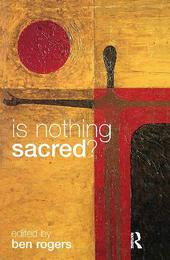
|
Is Nothing Sacred?
Paperback
Main Details
| Title |
Is Nothing Sacred?
|
| Authors and Contributors |
Edited by Ben Rogers
|
| Physical Properties |
| Format:Paperback | | Pages:160 | | Dimensions(mm): Height 198,Width 129 |
|
| Category/Genre | Philosophy
Philosophy of religion
Popular science |
|---|
| ISBN/Barcode |
9780415304849
|
| Classifications | Dewey:121.8 |
|---|
| Audience | | Tertiary Education (US: College) | | Professional & Vocational | |
|---|
|
Publishing Details |
| Publisher |
Taylor & Francis Ltd
|
| Imprint |
Routledge
|
| Publication Date |
20 August 2004 |
| Publication Country |
United Kingdom
|
Description
'I do feel a sense of the sacred in a number of respects and I could quote other scientists who feel the same.' Richard Dawkins. We call many things sacred, from cows, churches and paintings to flags and burial grounds. Is it still meaningful to talk of things being sacred, or is the idea merely a relic of a bygone religious age? Does everything - and every life - have its price? Is Nothing Sacred? is a stimulating and wide-ranging debate about some of the major moral dilemmas facing us today, such as the value of human life, art, the environment, and personal freedom. Packed with clearly presented controversial issues, we are asked to decide whether we should revere life when someone chooses to die, preserve the giant California redwoods, cherish Vermeer's originals for their own sake, or curtail personal freedom for the greater good. Ronald Dworkin argues that the concept of the scared is essential to any human ethics, and Simon Blcakburn explains why he thinks 'a humanist should not feel guilty at the emotions of awe and reverence that can be inspired by great religious works of art. Throughout, the idea of the sacred in a secular age is hotly debated amongst the authors and put
Author Biography
Ben Rogers is based at the Institute for Public Policy Research in London. He is the author of Beef and Liberty: Beef, Bull and English Patriots (2003), A J Ayer: A Life (1999) and Pascal (1998).
Reviews"'I do feel a sense of the sacred in a number of respects and I could quote other scientists who feel the same.' Richard Dawkins."
|